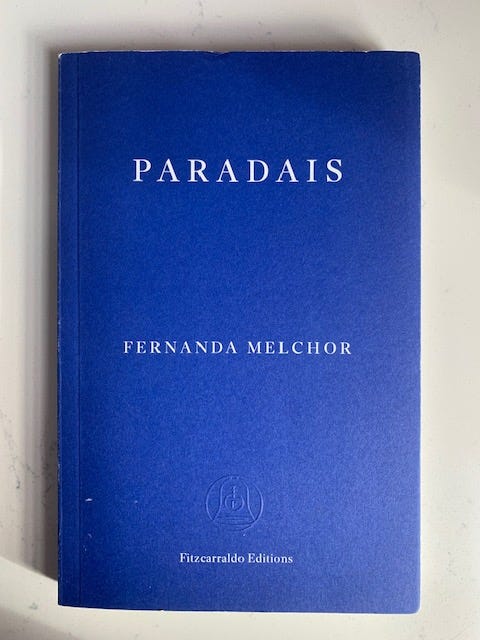'Paradais' by Fernanda Melchor
'Polo was left standing on the edge of the lawn, his phone still in his hand and his eyes welling up with tears of humiliating impotence.'—Review #182

‘Paradais,’ Fernanda Melchor’s brand new novel—so new that the U.S. edition doesn’t hit bookstores until next month—landed in my mailbox out of nowhere (but really, from the U.K.). I wasn’t aware Melchor had a new book coming out, or that the English translation was being published by Fitzcarraldo Editions, one of my favorite indie publishers. Some of you may remember that I raved about her ‘dark, intense and brilliant’ previous book, ‘Hurricane Season,’ so when I opened the package, I was like:

I had to drop everything and read it.
Here’s the cover:

At a luxury residential development in Mexico two teenage boys are up to no good. Polo is the narrator and works as a gardener, and Franco is a resident living with his grandparents. Polo and Franco spend hours getting drunk together, with Franco regaling Polo with his endless vulgar fantasies about having sex with a neighbor who’s recently moved to the complex with her husband and two children. Polo listens while simmering with rage. He’s angry that his mother hounds him for flunking out of school and being unable to find work until she got him the lowly gardening gig. He’s angry that his pregnant cousin has moved in and taken his bed, forcing him to sleep on the floor. He’s angry that he has no social outlet besides Franco, whom he despises. He’s angry that another cousin, Milton, won’t return his relentless texts and won’t give him entrée into the Mexican gang world. Through their drunken carousing, a sinister plan is formed that I won’t explain any further because:
‘Paradais’ explores masculine toxicity, resentment and insecurities. We see the boys, Polo in particular, project their anger, shame and self-loathing onto just about everyone—from bosses, to parents, to other men viewed as being more powerful or successful—but overwhelmingly onto women. Though the boys come from two very different class and social backgrounds, Melchor shows us that malice and misogyny know no such distinctions. The pair end up on the same tragic path, without hope or moral compass, the climax of which is as violent and surprising as a flying knee to the face:
Though it just came out in the U.K., ‘Paradais’ is already long-listed for the 2022 International Booker Prize. It is definitely worthy of that distinction, as well as of the Booker Prize’s description as ‘a chilling torrent of prose.’ Melchor’s writing is riveting. Similarly to ‘Hurricane Season,’ this book is full of long sentences and monolithic paragraphs, but Melchor’s prose (and Sophie Hughes’s translation) gallops relentlessly and beautifully. I love the title, a phonetic rendering of ‘Paradise’ meant to evoke a ‘gringo’ pronunciation of the upscale development that’s used by the author and her characters as explained in the text. In that one word, the reader feels like something is slightly off, and it hints at the trouble within the story. Also, like ‘Hurricane Season,’ this book should come with multiple trigger warnings. It’s disturbing and violent, but fascinating and engaging. If you’re up for a dark and challenging book, you should read ‘Paradais.’
How it begins:
It was all fatboy’s fault, that’s what he would tell them. It was all because of Franco Andrade and his obsession with Señora Marián. Polo just did what he was told, followed orders. Fatboy was completely crazy about her, and Polo had seen first-hand how for weeks the kid had talked about nothing but screwing her, making her his, whatever it took; the same shit over and over like a broken record, his eyes vacant and bloodshot from the alcohol and his fingers sticky with cheesy powder, which the fat pig only ever licked clean once he’d scoffed the whole jumbo bag of crisps. I’ll fuck her like this, he’d drawl, having clambered to his feet at the edge of the dock; I’ll fuck her like this and then I’ll flip her on all fours and I’ll bang her like this, and he’d wipe the drool from his mouth with the back of his hand and grin from ear to ear with those toothpaste ad teeth of his, big, white and straight and also clenched in rage as his gelatinous body wobbled in a crude pantomime of coitus and Polo looked way and laughed feebly and made the most of fatboy being distracted to swipe the bottle, light another cigarette and blow the smoke hard up into the air to repel the ferocious mangrove mosquitos. It was all just fatboy’s idea of a joke, just banter, drunk talk, or that’s what Polo had thought in the beginning, during their first benders down by the river, in the shadiest part of the small wooden platform that ran parallel to the water, just beyond the reach of the poolside lights and where the fig tree’s gnarled shadows kept them hidden from the development’s night watchmen and residents, most crucially Franco’s grandparents who, according to Franco, would have a stroke if they caught their ‘little boy’ consuming alcoholic drinks and smoking cigarettes with God knows what other crap; and worse still, in the company of a member of ‘the service’ — as that idiot Urquiza called the development’s employees — the gardener, no less; an out and out scandal, an abuse of trust that would cost Polo his job, which didn’t really bother him anyway because he’d gladly never set foot inside that fucking development again; the problem was that sooner or later he’d have to go home to have it out with his mother; and while that was an awful — not to say downright chilling — prospect, Polo still couldn’t help himself. He could never say no to that lard-ass when he waved at him from his window; he didn’t want to put an end to their drinking sessions down on the dock no matter how much that prick did his head in, no matter how sick Polo was of his bullshit and his endless obsession with the neighbour, who fatboy had fallen for that afternoon in late May when the Maroños drove into the Paradais residential development to pick up the keys to their new home, Señora Marián herself at the wheel of their white Grand Cherokee.
My rating:

‘Paradais’ by Fernanda Melchor was published by Fitzcarraldo Editions in 2022. It was translated from the Spanish by Sophie Hughes. 118 pages. £10.99 from Fitzcarraldo Editions.
Spoiler thread:
If you want to discuss plot points and character choices, meet me in the comments by clicking this button:
What’s next:
Before you go:
ICYMI: Review #181
Thanks for the shoutout: Thank you to the folks at The Side Blogger for featuring Books on GIF in their post: ‘How to Start Writing on Substack: A Beginner’s Guide.’ What a pleasant surprise!
In Memoriam: Stephen Wilhite, the inventor of the GIF file format, has died at age 74. According to The New York Times, the cause of death was complications from Covid-19. I will be forever grateful to Mr. Wilhite. His creation not only has allowed BoG (which, apparently, he would have pronounced Books on JIF) to exist, but it has also brought great joy to the world. Here is a tribute to him from the folks at Giphy:
Read this: I saw this Donald Justice poem on Twitter recently. It leveled me:
Thanks for reading, and thanks especially to Donna for editing this newsletter!
Until next time,

MPV














Sounds intriguing. I tend to be hesitant to pick up translations but this reads beautifully. Maybe I’ll try to challenge myself and read it in the original! Appreciate you always including a long excerpt btw—really helps to get a sense for the book.